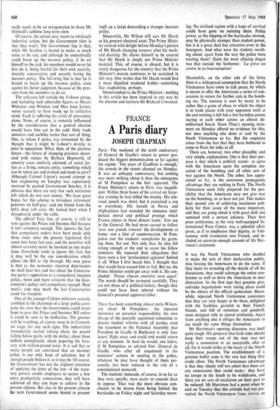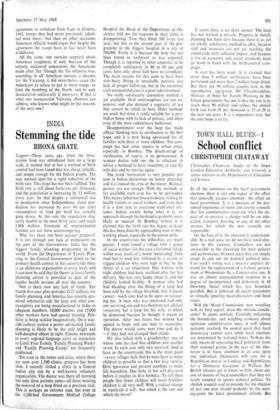A Paris diary
FRANCE JOSEPH CHAPMAN
Paris—The weekend of the tenth anniversary of General de Gaulle's return to power pro- duced the biggest demonstration so far against his regime. 'Ten years of Gaullism is enough,' the crowds in the streets chanted on Monday. It was an unhappy anniversary, but nothing was more striking about it than the emergence of M Pompidou as the heir apparent. The Prime Minister's return to Paris was magnifi- cent. Within three hours of his arrival on Satur- day evening he had stilled the mutiny. His tele- vised speech was short, but it contained a sop to everybody. His travels in Persia and Afghanistan had revealed the immense intel- lectual, moral and political prestige which France enjoys in those distant lands: first sop to the General. He had never ceased to follow 'avec une grande tristesse' the developments at home—not a hint of condemnation. M Pom- pidou met the students' complaints by grant- ing them, flat out. Not only that, he also felt strong enough at the end to cover his fellow ministers. He repeated their allegations that there were a few 'professional agitators' behind it all. When I first heard him, I thought that that would have caused him to fail. But no, the Prime Minister could get away with it. He con- cluded : 'Puisse chacun entendre mon appel.' The words should be savoured carefully. They are not those of a political lackey, though they could not have been uttered without the General's personal approval either.
There has been something almost early-Wilson- ian about M Pompidou : the repeated insistence on personal responsibility, his own charge of the specially appointed committee to discuss student reforms with all parties, even the statement to the National Assembly that President de Gaulle in Bucharest is only four hours' flight away and could and would return at any moment. At least he would, one infers, if M Pompidou so advised him. General de Gaulle, who after all acquiesced in his ministers' actions in sending in the police, whatever he may have thought of them per- sonally, has been reduced to the role of a constitutional monarch.
The students' demands, of course, in so far as they were specific, were easier to concede than to oppose. That was the most obvious con- clusion to be drawn from being behind the barricades on Friday night and Saturday morn- ing. No civilised regime with a hope of survival could have gone on resisting them. Police power, as the slipping of the barricades showed, may be physically stronger than student power, but it is a great deal less attractive even to the bourgeois. And what were the students revolt- ing about, apart from the way the police were treating them? Quite the most alluring slogan was that outside the Sorbonne: 'La gave est contre la technocratisation.
Meanwhile, on the other side of the Seine there is a widespread assumption that the North Vietnamese have come to talk peace, by which is meant to offer the Americans a series of con- cessions in return for further cuts in the bomb- ing etc. The exercise is seen by many to be rather like a game of chess, in which the object is to trade pieces with your opponent until at the end notning is left but a few harmless pawns staring at each other across an almost de- militarised board. Xuan Thuy's opening state- ment on Monday offered no evidence for this; nor does anything else done or said by the North Vietnamese so far. But the suspicion arises from the fact that they have bothered to come to Paris for talks at all.
There are, however, two other plausible, and very simple, explanations. One is that their pur- pose is that which is publicly stated : to agree with the Americans upon the complete ces- sation of the bombing and all other acts of war against the North. The other, less appre- ciated so far, is the enormous propaganda advantage they are seeking in Paris. The North Vietnamese seem fully prepared for the pos- sibility that the Americans may not give way on the bombing, or at least not yet. This makes their second aim of achieving maximum pub- licity for their cause all the more important, and they are going about it with great skill, not - unmixed with a certain jokiness. Their first press conference, at the very well-equipped In- ternational Press Centre, was a splendid affair given, as if to emphasise their dignity, in Viet- namese, with translation into French, and in- cluded an accurate enough account of Mr Har- riman's statement.
It was the North Vietnamese who decided to make the text of their declaration public, thus forcing the Americans to do the same. If they insist on revealing all the details of all the discussions, they could sabotage the entire con- ference as well as drive the Americans to near distraction. So the first sign that genuine give- and-take negotiations were taking place could be the silence of the official spokesmen. Mean- while, repeated North Vietnamese assurances that they are very happy to be there, delighted with the facilities, grateful to their French friends, and full of optimism and goodwill, seem designed only to spread confusion. Apart from anything else it obliges the Americans to say much the same things themselves.
Mr Harriman's opening discourse was itself quite tough. His proposal that both sides should keep their troops out of the DMZ was not really a concession or an acceptable offer at all, for it would strike at the heart of the North Vietnamese position. The establishment of a genuine buffer zone is the very last thing they could allow. The North Vietnamese advantage is that they simply will not admit that there are any concessions they could make: they have no troops in the South to be withdrawn, and there are no acts of escalation on their part to be reduced. Mr Harriman had a point when he said on Tuesday that this attitude had not pre- vented the North Vietnamese from sinning an agreement to withdraw from Laos in Geneva, 1962, troops they had never previously admit- ted were _there: but then on other occasions American officials would argue that despite the agreement the troops have in fact never been withdrawn.
All the same, one remains sceptical about American toughness; if only because of the entirely unilateral concessions the Americans made after Tet. Though the Tet offensive was, according to all American sources, a disaster for the Vietcong, it did nevertheless cause the Americans to refuse to put in more troops, to limit the bombing of the North, and to seek deescalation unilaterally if necessary. If that is what one unsuccessful Vietcong offensive can achieve, who knows what might be the rewards of the next one?







































 Previous page
Previous page